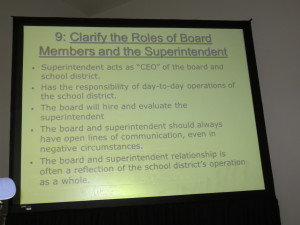ATTENDED THIS SESSION AT THE NSBA Conference last week:
A question that frequently arises among school members, new and seasoned is, “Can I be sued?” While there are no guarantees against a lawsuit being filed, it is important consider actions to take to limit school board exposure to potential liability.
Most states provide indemnification to school board members for actions taken within the parameters of their school board responsibilities. However, at Monday’s session at National School Boards Association’s Annual Conference, Connecticut Association of Boards of Education staff — Deputy Director and General Counsel Patrice McCarthy, Executive Director Robert Rader, and Senior Staff Attorney Kelly Moyher – offered 10 suggestions on how to limit potential for liability should a lawsuit arise.
For starters, know the boundaries of your authority. The authority of local school boards is derived from a state’s constitution, statutes, and regulations. Board bylaws and policies provide additional direction.
Next, focus on the board’s policymaking role. Boards are policymaking bodies responsible for establishing rules and procedures for running the schools. Numerous state and federal laws mandate that certain policies must be in place, but generally allow school boards to determine the specific details.
School boards should adhere to the student discipline policy. This is an important area for boards and their administrators to carefully follow established policies and regulations. Through policies, boards establish the code of conduct and sanctions for violations.
Understanding the staff discipline process also is key, while reviewing and adhering to policies on holiday celebrations is important for a board, too. Boards serve an important role in promoting community understanding on policies in both areas.
Serious consideration must be given to the laws governing board meetings. Board members only have power when they act as a body. Each state has detailed requirements for the conduct of public meetings and a periodic workshop for the board and administrative staff will help insure compliance with state law.
Avoiding nepotism, conflicts of interest and understanding the ethical considerations for board of education members is also crucial to the legal functionality of a board of education. National School Boards Association has a sample code of ethics for school board members, as do many state school board associations. Local and state laws will also govern these areas.
The board and superintendent relationship is critical for the district’s effective operation and public perception. To this end, be sure to clarify the roles of board members and the superintendent.
Conduct a thoughtful and thorough superintendent search process. Hiring a superintendent is the single board action that will most likely have the greatest long-term impact on a district. State law, statutes, and regulations provide guidance on hiring and certification requirements, as well as Freedom of Information or open meetings law provisions.
Unfortunately, after the tragic events in Newtown, Conn., late last year, board members and other school and community officials must take a close look at security, student discipline, and mental health issues. District policies should be considered for possible changes and additions to ensure student and staff are safe while in school.
School board members can reduce their exposure to liability — and perform their functions more effectively — by periodically reviewing the statutory and policy provisions that establish their authority and responsibilities. This is time well spent, and can be incorporated into the board’s annual schedule of agenda items.

